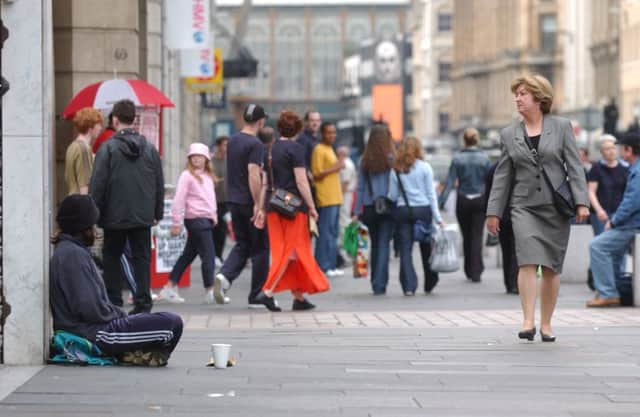Scots being pushed into homelessness due to high rental costs


The report by the Scotland Institute think tank says Scotland had almost one million social rental homes in 1990, but this had dropped to 600,000 by 2010. Increasing rental costs have seen 210,000 Scots fall into poverty simply due to the extra burden of housing costs, with 120,000 of these renting in the private sector.
Scotland Institute chairman Dr Azeem Ibrahim said: “We need radical action to counteract the severe crisis in our country’s housing which can only be addressed by re-imagining local taxation to force unused land into use and curb land price inflation which lies at the root of many of our problems with the availability and affordability of housing
Advertisement
Hide AdAdvertisement
Hide Ad“The Scottish government has done good work on reducing homeless and providing 31,000 homes under the Affordable Housing Act in four years but this it is not nearly enough to repair decades of neglect.
“UK Government policy, especially welfare changes such as a benefit caps, housing benefit reductions and the impact of Universal Credit will all place the family incomes of the poorest in our country under even more pressure so we must act quickly.”
The report found that homelessness in general is falling across Scotland, in part due to government policies, but that in 2015 it has been estimated that 50,000 adults – or 1.1 per cent of the population – experienced some form of homelessness, with 5,000 of those having at least one night on the streets. The main reason for this is simply lack of income caused by the high costs of housing.
Equally housing issues correlate closely to both occupation and age, meaning some social groups are affected disproportionately more than others. For example, 82 per cent of those in higher managerial jobs own their own homes, compared to 55 per cent in more routine occupations. More over 55s and under 34s also access social renting than private.
Rent differentials mean social housing in Scotland is £65 per week while the private sector is £108pw – and housing costs take up a higher proportion of income for those on the lowest incomes.
So, in conclusion, the current social housing practice in Scotland is welcome and a move in the right direction but simply not taking place in high enough numbers to make the difference needed.
Solution
But the key issue remains about how to fund the solution to this problem – as well as taxation changes, a rent increase as a means of improving supply of local authority housing also needs to be looked at, as estimates suggest that a £10 per week increase could generate £150m pa – but an urgent discussion needs to take place about this and other potential solutions before the current housing crisis worsens further.
An SG spokesman said: “The Scottish Government recognises the critical role that housing plays in promoting social justice, strengthening communities and tackling inequalities.
Advertisement
Hide AdAdvertisement
Hide Ad“We invested £1.7 billion in affordable housing over the lifetime of the last Parliament and exceeded our target to deliver 30,000 affordable homes, including our 20,000 social rented homes target and within that our 5,000 council homes target.
“Our target for the next five years is to deliver at least 50,000 affordable homes, 70% of which will be for social rent - a 75% increase on our previous social rented target. This new ambitious target is being backed up with investment of over £3 billion.
“From January this year, housing subsidies have been increased by up to £14,000 for social and affordable homes for rent being delivered by councils and registered social landlords over the next three years, with incentives being offered for those homes achieving a higher greener standard.
“Ending the right to buy for all social housing tenants in Scotland will protect the existing stock of social rented homes and prevent the sale of up to 15,500 houses over a 10 year period.”